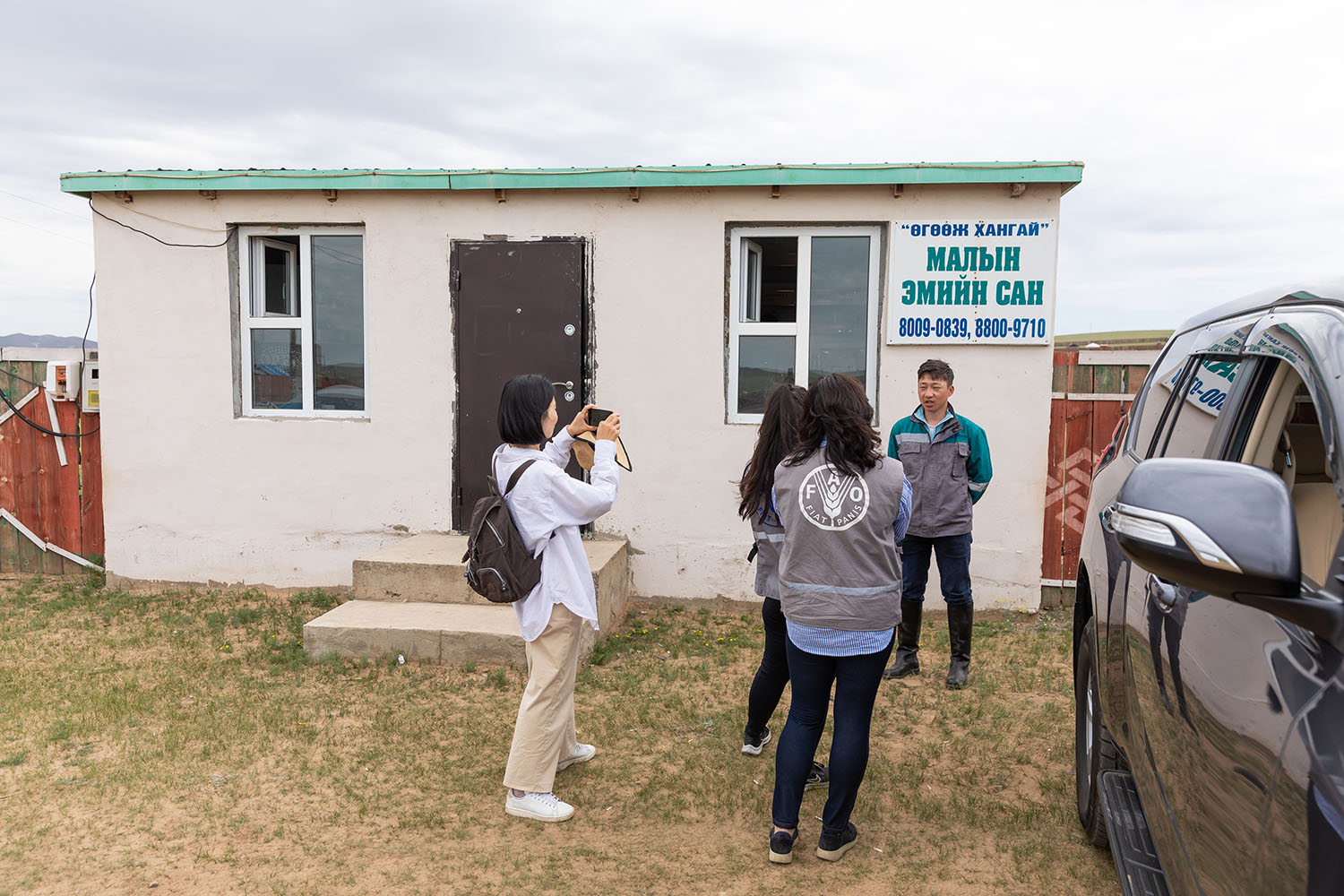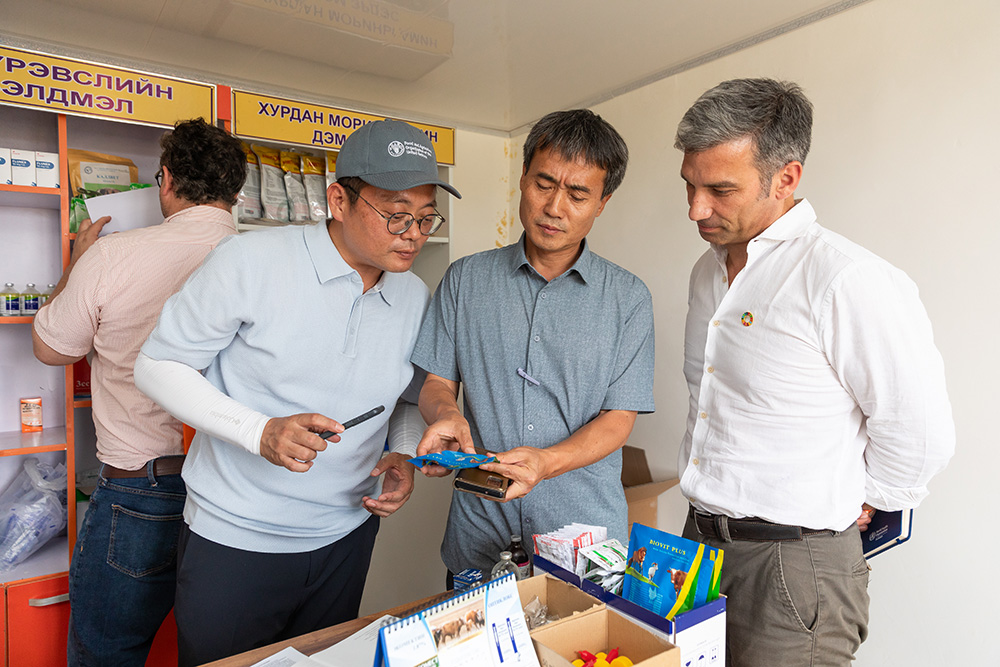ACT project in Mongolia / Strengthening collaboration in combating foodborne antimicrobial resistance
As part of the “Action to support implementation of Codex AMR texts (ACT)” project, Mongolia is actively enhancing its collaboration efforts to combat foodborne antimicrobial resistance (AMR). A delegation from the FAO visited the country on 12-14 June 2023 to gather information on how the project is advancing.
“According to some global studies, the potential economic cost of antimicrobial resistance is comparable to the global financial shocks of 2008-2009. I commend the action of the Government of Mongolia in containing foodborne AMR," said Vinod Ahuja, FAO Representative in Mongolia.
The State Secretary of the Ministry of Food, Agriculture and Light Industry (MOFALI) of Mongolia, Jambaltseren Tumur-Uya noted that it is crucial to detect and contain foodborne AMR, including assessment of risks, capacity building of national surveillance, improvement of laboratory capacity, and delivery of accurate information to the public. “In this area, the Ministry will work closely with the ACT project team,” Jambaltseren said.
Enkhtur Byakharjav, National ACT Project Coordinator in Mongolia, said that Mongolia has been actively working on developing a regulatory framework to address foodborne AMR. “Thanks to the ACT project, we assessed the AMR status and surveillance system in our country. Different meetings and workshops helped us identify a list of actions, including the development of a Multi-sectoral National Action Plan for the control of AMR, endorsed by relevant ministries in May 2022 - a major milestone,” Byakharjav said.
During the mission, the FAO team engaged with various stakeholders in Mongolia, including the Ministry of Food, Agriculture and Light Industries, the General Authority of Veterinary Services, the National Codex Committee, and the Multi-Sectoral Coordination Committee for the National Action Plan on Antimicrobial Resistance. Discussions addressed current understanding and practices related to the use of antimicrobials as growth promoters, the need for AMR surveillance in agrifood systems, and the required next steps, including legal considerations.

Altanbulag, Mongolia - Meeting with Altangerel Dashdenberel, a private veterinarian at his pharmacy.
A meeting with national veterinary and food safety laboratory personnel led to agreement on the development of a pilot study to test for AMR in samples collected from slaughterhouses. This initiative is an important step towards the establishment of a sustainable AMR surveillance program in the country as it will help in identifying the logistical and technical challenges to be overcome.

Altanbulag, Mongolia - Team checking the labelling of veterinary drugs in a pharmacy (from left to right): Sangmok Lee, Scientific Officer of the Livestock Products Safety Policy Division at the Ministry of Food and Drug Safety, the Republic of Korea, Sung-il Kim, Director of the Livestock Products Safety Policy Division at the Ministry of Food and Drug Safety, the Republic of Korea, Jorge Pinto Ferreira, FAO Food Safety Officer.
A field visit to meet with the Vice Governor of Altanbulag, public and private veterinarians, and nomadic herders to discuss foodborne AMR issues in Mongolia, highlighted concerns about the use of antimicrobials, the perceived quality of veterinary products and their availability in the country.
The ACT team is currently cooperating with AMR projects in several Asian countries as part of the regional AMR strategy. In Mongolia, the project is committed to coordinating its activities with those of the Multi-Partner Trust Fund and the World Bank Livestock Commercialization Project to minimize redundant efforts and maximize the effective use of limited resources. “This visit confirmed that collaborative commitment and a One Health approach are crucial to addressing and managing foodborne AMR,” said Jeff LeJeune, FAO Food Safety Officer and lead on the project.

Altanbulag, Mongolia – Discussion in the herder’s house (from left to right): Jeff LeJeune, FAO Food Safety Officer, Ganchuluun Banzragch, nomadic herder, Jorge Pinto Ferreira, FAO Food Safety Officer.
Additionally, representatives from the Ministry of Food and Drug Safety of the Republic of Korea, donors of the ACT project, participated in part of the mission and viewed firsthand the impact their contributions are making to combating AMR on a global scale.
“It was a remarkable opportunity to participate in this mission as a donor country. This enabled us to witness both the advancements made and the challenges encountered,” said Sung-il Kim, Director of the Livestock Products Safety Policy Division at the Ministry of Food and Drug Safety, the Republic of Korea.
Implementation of Codex standards reduces the emergence and transmission of AMR in food systems, enhancing safety and fair trade. As part of the ACT project, Mongolia is working on adopting and implementing Codex AMR standards in the country, raising public awareness, and improving surveillance system related to antimicrobial resistance and antimicrobial use.
Learn more
Information about the ACT project
Join the conversation on social media using the hashtag #AMRCodexTexts.
Photo credit © FAO Mongolia/Uugan-Erdene Gantumur
Main photo: 12-14 June, Altanbulag, Mongolia – FAO delegation gathering information on the advancement of the project
Categories
- (11)
- (3)
- Animal Feed (8)
- Antimicrobial Resistance (39)
- Antimicrobial Resistance (78)
- CAC46 (15)
- Codex Texts (20)
- Codex Trust Fund (1)
- Codex60 (19)
- Contaminants (13)
- Contaminants (10)
- COVID-19 (64)
- Elections (6)
- Food Safety (126)
- Labelling (10)
- Nutrition and Labelling (5)
- Nutrition and Labelling (7)
- Observers (23)
- Pesticides (7)
- Standards (78)
- World Food Safety Day (154)


